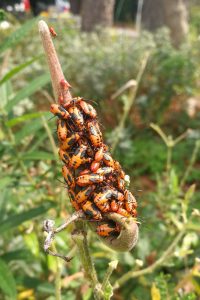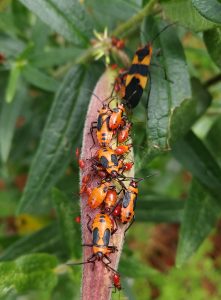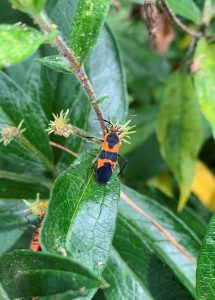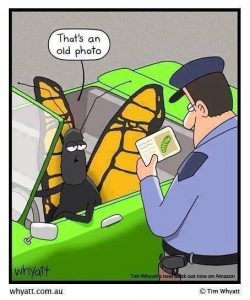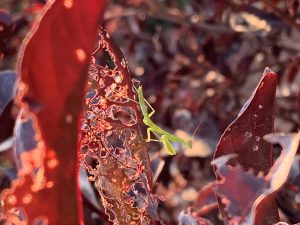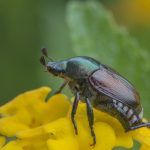The Pest is Yet to Come, Vol. 2
The Bad news first
Oleander Aphids (Aphis nerii)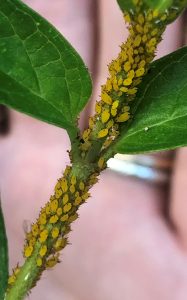
I am approached regularly by worried Monarch raisers with pictures of oleander aphid infestations. Their ability to give live birth can drastically spike their numbers in just a few weeks, even days, planting seeds-of-doubt in competent gardener minds. But these are generally nothing to fret over. They do not dissuade Monarchs from laying eggs on aphid-infested milkweed, nor do the aphids harm the caterpillars. I have had oleander aphids on milkweed as long as I have had Monarch caterpillars on milkweed. Many folks who see their milkweed stems coated in the glistening aphid bodies start to panic and turn to pesticides. Don’t! When you use neem oil or insecticidal soap, you inadvertently hurt other insects too, including Monarchs. Deprogram that instinct. I recommend a few deep breaths and a hose with a powerful sprayer. Jet spray these guys off of the new growth several times a week. Keep in mind there are many predators of aphids—parasitic wasps, lady bugs, solider beetles and damsel flies. When your first response is to use insecticide, you are affecting all of those insect communities that SHOULD be your first line of defense. Beneficials won’t come to your yard if the buffet is closed.
Lace Bugs
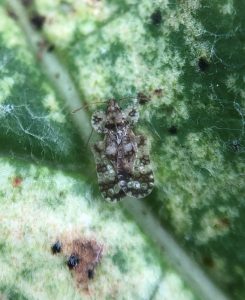 The first signs of lace bugs begin in March, so we are a little behind! The underside of leaves are “hot spots” for lace bugs—you will notice white stippling on the foliage. Their damage may be unsightly, but they are so intricate and detailed in appearance. The lacey-looking mother will embed her eggs into the leaf tissue and then cover them with a black secretion. These eggs overwinter then begin their destructive reign when temperatures warm in the beginning of spring. Hort oil is an excellent control that can be used in the early spring and later in summer. Since we are looking at temperatures over 90, try BotaniGard ES or Talstar P instead. Make sure you are mindful of the wind (not over 10mph) and that it’s not likely to rain in the next 24 hours.
The first signs of lace bugs begin in March, so we are a little behind! The underside of leaves are “hot spots” for lace bugs—you will notice white stippling on the foliage. Their damage may be unsightly, but they are so intricate and detailed in appearance. The lacey-looking mother will embed her eggs into the leaf tissue and then cover them with a black secretion. These eggs overwinter then begin their destructive reign when temperatures warm in the beginning of spring. Hort oil is an excellent control that can be used in the early spring and later in summer. Since we are looking at temperatures over 90, try BotaniGard ES or Talstar P instead. Make sure you are mindful of the wind (not over 10mph) and that it’s not likely to rain in the next 24 hours.
Yucca Bugs (Halticotoma valida)
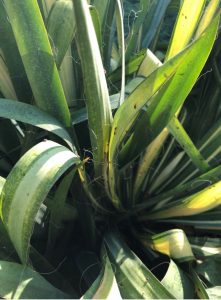
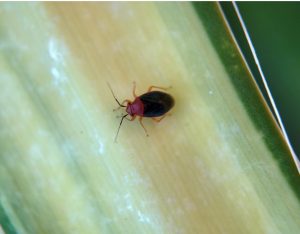 Have you noticed your yuccas becoming yellow and stippled? The culprit could be the ever annoying yucca bug. These guys are blue-black with shiny orange-red heads. Their brand of annoyance involves sucking out the juices inside of yucca leaves resulting in yellow, stippled foliage. It can be challenging to spot them because they are on the move the moment they are approached. Texas A&M recommends “using an insecticide with bifenthrin.” Once the heat dies down towards the end of summer, applications of Hort Oil are very useful. Just be sure to stick with the follow up sprays…and beware of the point ends while you are spraying!
Have you noticed your yuccas becoming yellow and stippled? The culprit could be the ever annoying yucca bug. These guys are blue-black with shiny orange-red heads. Their brand of annoyance involves sucking out the juices inside of yucca leaves resulting in yellow, stippled foliage. It can be challenging to spot them because they are on the move the moment they are approached. Texas A&M recommends “using an insecticide with bifenthrin.” Once the heat dies down towards the end of summer, applications of Hort Oil are very useful. Just be sure to stick with the follow up sprays…and beware of the point ends while you are spraying!
Now, the good (or maybe just neutral) news
Large Milkweed bugs (Oncopeltus fasciatus)
Another frequent flyer of the milkweed is the aposematically (warning!!!) marked Large Milkweed Bug. While they are not necessarily beneficial, they are, like the Oleander aphids, not worthy of panic or treatment. That’s good news in itself. Those of you who despise the spread of certain milkweeds should consider their presence to be beneficial in your gardens. They mainly feed on the seeds and seed pods—as a result they reduce the seed’s viability. They pierce the seeds and pods to inject enzymes that dissolve the tissue inside. The result is a liquified meal they readily suck up. If you are worried about your seeds, wrap your pods in an organza bag. Just remember, they are part of the ecosystem and do not pose a threat to your milkweed populations. There is usually more than enough seed to go around. The fact is, milkweed is a banquet for many native insects, not just Monarchs. The pictures below show the nymphs congregated together on a seed pod. Thanks to Curator Carl Simmons for the adult picture on the right.
Horticulturist Colton Tomsic spotted an immature praying mantis while looking for Japanese Beetles this week!
If you guys see any insects you think are worthy, or just plain creepy, reach out to me! I am always happy to help figure out what the heck it is or share the excitement with others.


